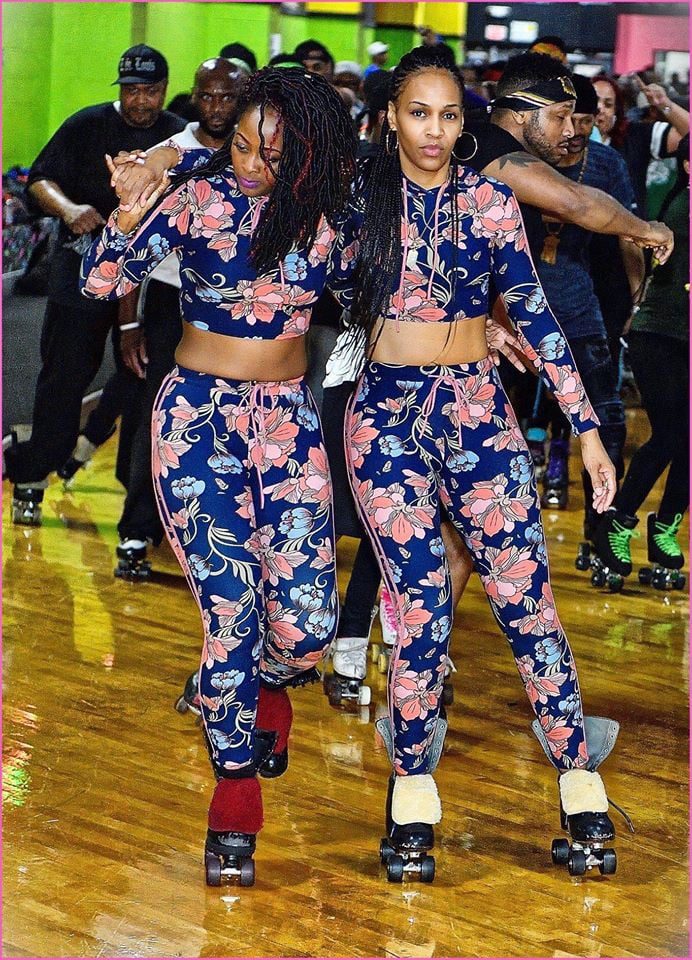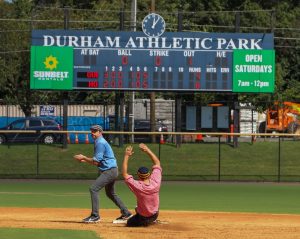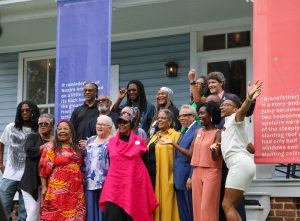On May 26, 2020, working mom Cara August laced up a pair of roller skates for the first time in over 30 years. She swung open her front door and shakily skated out into her suburban Durham neighborhood, too excited to wait for her protective knee and elbow pads to be delivered. She was finally taking some time for herself.
“It made me feel empowered to make some sort of choice — to do something fun that was still safe and didn’t put anybody else in jeopardy,” said August, who works a day job in communications.
August joined legions of roller skating enthusiasts across the country who, over the past year, have strapped on a set of wheels and taken to the streets — whether in a city park or in a cul de sac.

The pandemic hobby has soared in popularity. Instagram and TikTok gained a whole new set of influencers: roller skaters taking over the internet, even appearing in Vogue magazine.
In Durham, the activity became a way for locals to get outside and move during quarantine. That’s visible during a quick drive past open spaces downtown like vacant parking lots or Durham Central Park, where skaters freestyle moves across the pavement.
“We’ve seen a big increase in outdoor activity, and roller skating is part of that,” said Durham Parks and Recreation (DPR) Assistant Director Thomas Dawson.
With piqued interest among Durhamites, Dawson says DPR hopes to launch roller skating classes in 2021 or 2022.
In November 2020, DPR announced its plan to buy Wheels Fun Park, a historic Durham roller rink. The city aims to revamp the venue into a community and aquatics center in the next few years, and Dawson expects the roller rink won’t be going anywhere.
“Most likely there will be a strong voice for preserving the roller skate rink,” he said.
While he doesn’t want to make any promises until hearing directly from Durham’s community, he noted that “the purchase of this historic site has brought a lot of groups out of the woodwork who love the Wheels roller facility.”
Eddie Watson, founder of the Raleigh-Durham Skaters Association, is excited to see this Durham staple stick around. Watson, who has skated for 30 years, is thrilled that roller skating is “in the spotlight,” mentioning how he has seen the sport pop up on Good Morning America, in Usher videos and all over social media.

Popular again
Increased visibility like this has caused a surge in demand for skates, especially during the pandemic. By May 16, 2020, U.S. Google searches for “roller skates” reached an all-time high.
“I ordered Moxi Skates and it took six months to get them because roller skating blew up so much,” August said.
Global brands like Moxi and Impala claim three-to six-month wait times, frustrating customers who are waiting for their wheels to arrive. The Wall Street Journal reported that manufacturing parts from China and Taiwan have taken twice as long to be delivered. The popularity resulted in supply-chain issues, which were exacerbated by coronavirus restrictions, including limited production from U.S. manufacturing facilities.
Roller skating dates back to the Victorian era when touch between young men and women was strictly forbidden. Socially approved skating permitted young couples to visit one another without the taboo of physical contact. Ironically, such social distancing is useful today.
In the 1900s, skating in the U.S. became integral to the civil rights movement. Some of the first protests against racial discrimination were skate-ins, where African-American skaters protested the segregation of roller rinks. As highlighted in the 2020 Emmy Award-nominated documentary “United Skates”, roller skating established “families” in Black communities, even after desegregation.
Still, roller rinks continued racial discrimination by terming Black skating events “adult nights” or soul nights. By redefining these nights to celebrate Black culture, regional and personal skating styles emerged. From Detroit’s “Open-House” Slide to Bill Butler’s “Jammin’”, style skating developed in tandem with new waves of electronic dance music.
Fun for the whole family
Gearing up to teach new and experienced skaters of all ages, Watson emphasized the physical and mental health benefits of skating.
“Physically, it helps your lung capacity,” he said. “[Mentally,] a skate rink for three or four hours maybe takes you away from any issues—especially with good music and good people.”
Both The American Health Association and the President’s Council for Physical Fitness confirm Watson’s words. Roller skating causes 50% less stress on joints than running, is five times less dangerous than biking, and provides a “complete aerobic workout.” It’s also a great way to get children moving.
On top of the physical and mental benefits, roller skating is a sport for all ages.
“I’ve seen six, seven-year-olds catch on real good,” said Watson, “and up to 80 and 90-year-olds still skating — whether it be just a regular shuffle skate type of thing or dance skate.”
After seeing their mom’s newfound love for skating, August’s daughters, ages three and seven, asked for skates of their own. By moving carpets, clearing furniture and opening doors in her house, August created a small roller rink where she could teach her two daughters to skate on the hardwood floors.
Parents have been particularly affected by the pandemic as they balance work, children and self-care. “We’re all stressed and scared,” August said, noting that it’s been hard to find time for herself.
According to recent PEW Research Center results, working moms are 11% more likely than working dads to say balancing life and work responsibilities became more difficult during the pandemic. With working women spending 50% more time on child care than their husbands, a new study by A Great Place to Work and the Maven Clinic says women are 28% more likely than their husbands to become burnt-out.

Pilar Timpane, a filmmaker and mother of two, describes it as two choices at odds with each other.
“You end up feeling like you should either be doing something for your kids or doing something for your work,” she said.
Wanting to find a hobby that she could easily learn while spending time alone, Timpane took up roller skating after feeling empowered by women she saw skating on Instagram. She quickly fell in love with the pair of skates she was gifted for Christmas.
“I think of roller skating as a good time; it’s just joyful,” she said.
Reminiscing on their preteen skating days, both Timpane and August quickly caught back on. They especially love skating because it can be a solo adventure or a family affair.
“We’re a family on wheels,” Timpane said, noting how she roller skates while her husband bikes, her three-year-old daughter scooters and her one-year-old naps in her stroller. When Timpane skates alone, she revels in the little moments to enjoy the physical activity.
Similarly, August’s family is her “little skate crew.” But August also makes time for herself. Putting on her headset and zoning-out, she “grooves,” she says,”skate-dancing” on Durham’s iconic American Tobacco Trail.
The roller skating revival is one silver lining of the pandemic. August sees it as a way to connect with her kids, too.
“Hopefully they’ll remember and look back on it fondly. Like ‘yeah, that year sucked, but at least we learned how to roller skate.’”
9th Street Journal reporter Eleanor Ross can be reached at eleanor.ross@duke.edu
Top: Before the pandemic, the Raleigh-Durham Skaters Association threw skating parties throughout the state. Photo courtesy of Eddie Watson.





